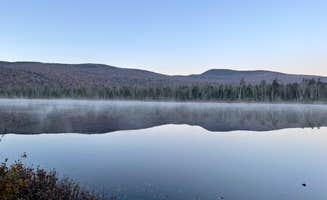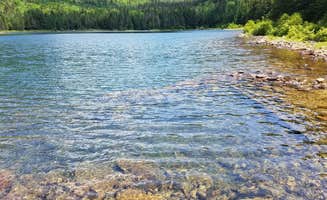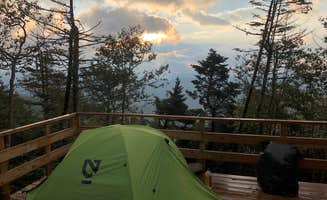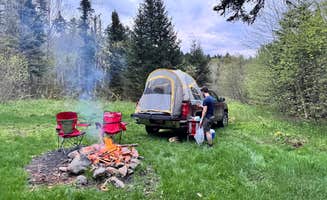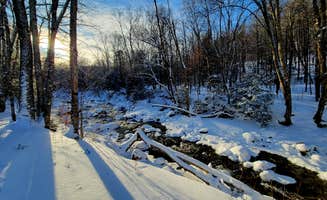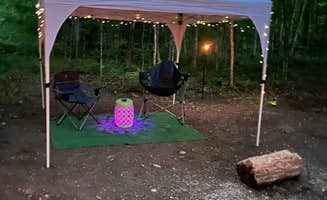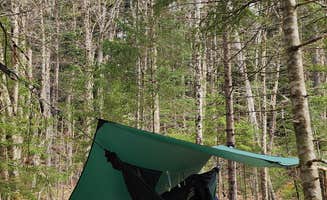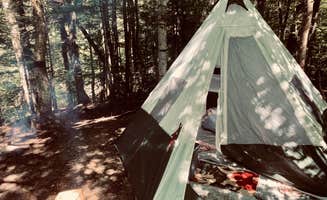Dispersed camping near Pike, New Hampshire offers primitive sites within the rugged White Mountain National Forest, an area characterized by dramatic elevation changes from 1,000 to over 5,000 feet. Most sites sit on former logging roads and require self-contained camping with no running water or electrical hookups. Winter access becomes extremely limited as most forest roads close after the first significant snowfall, typically from mid-October through late May.
What to do
Hiking opportunities: From Guyot Shelter, campers can access numerous trails including the challenging Pemi Loop. "We got to the site, claimed our platform and hiked over to West Bond to catch a beautiful sunset," notes one visitor who appreciated the shelter's strategic location for summit views.
Swimming and cooling off: The Town Hall Road Dispersed sites offer river access for hot summer days. "Down toward the river there was plenty of open space so we pitched there and built a fire pit. There are trout in the river and if you cross and go through the woods to the right there's some great spots to explore further!"
Fishing access: Multiple streams around primitive camping areas provide fishing opportunities. One camper at Elbow Pond noted: "There's a nice pond with great views and good fishing." Most water bodies in the region require a New Hampshire fishing license, available online or at local sporting goods stores.
What campers like
Secluded sites: Many primitive campers appreciate Cherry Mountain Road Dispersed for its isolation. "We did not hear any other camping sounds at all. It was so quiet I could hear the sound of crow wings flapping as they flew by," reports one camper who enjoyed the solitude.
Natural soundscapes: Campers frequently mention the peaceful river sounds at sites like Haystack Road. "These are my go to sites when I am in the Franconia Notch area. They have a fire pit, plenty of woods around, and are free," writes one regular visitor who uses these sites as a staging ground for multiple adventures.
Stargazing opportunities: The minimal light pollution around Pike makes for exceptional night sky viewing. "We enjoyed a spectacular view of the Blood Super Moon from the campsite," reports a Cherry Mountain Road camper. Clear nights typically offer views of the Milky Way between June and September when skies remain dark enough from approximately 10 PM to 4 AM.
What you should know
Bear safety requirements: Numerous reports confirm bear activity throughout the region. At Tripoli Road, campers should know that "Following the July 4, 2019 holiday, the camping area was closed after bears visited campsites and got into food that was left in the open and not secured in vehicles or bear canisters."
Seasonal road conditions: Many primitive sites become inaccessible during mud season or after heavy rains. "Make sure to have a backup plan during the mud season," suggests one visitor to Green Mountain National Forest dispersed sites, noting that some roads may be impassable even with high-clearance vehicles.
Site availability fluctuations: The most accessible sites fill quickly during peak periods. "It's first come first serve, so be sure to get up early on Friday for a weekend campout," advises a Tripoli Road camper. Holiday weekends often see all sites occupied by Thursday evening during summer months.
Tips for camping with families
Choose more developed options: For camping with children, sites with minimal amenities may present challenges. A visitor to Guyot Shelter mentioned, "Sufficient amount of platform, water source, bear proof Joe box, pivy and springs all at one spot," making it more suitable for families than completely primitive locations.
Site selection for safety: When primitive camping with children, consider the terrain around your chosen site. "We drove down the road a bit, past a few tent sites just off the road. About the fifth one or so, you pull in and the fire pit is right there. Then walk down a bit and there's a large group site with another pit," explains a Town Hall Road camper describing sites with space for family activities.
Pack extra water: With no potable water sources at most primitive sites, families should bring 1-2 gallons per person per day. "No drinking water, electricity, or hookups are available at most locations," so prepare accordingly, especially with children.
Tips from RVers
Vehicle clearance requirements: Many primitive sites around Pike require high-clearance vehicles. "I wouldn't recommend trying to take a normal sedan or something down there and the sites are a little less spread out than I wanted," cautions an RV camper at Elbow Pond Road, highlighting the importance of appropriate vehicles.
Site sizing varies significantly: RVers should scout potential sites before attempting to park. "There are 11 options, each completely separated from the others," notes a visitor to Haystack Road, adding that the spots differ dramatically in size and access difficulty.
Alternative parking options: For larger vehicles, designated parking areas near trailheads sometimes offer overnight options when primitive sites won't accommodate your rig. "We were able to collect sunlight onto our solar panel from the site," notes a Cherry Mountain Road camper, indicating some clearings provide adequate solar exposure for RV systems.


